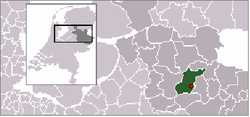Nijverdal
| Nijverdal | ||
|---|---|---|
| Town | ||
|
Sallandse Heuvelrug National Park near Nijverdal | ||
| ||
 Location in Hellendoorn, Overijssel, Netherlands | ||
| Coordinates: 52°22′N 6°28′E / 52.367°N 6.467°ECoordinates: 52°22′N 6°28′E / 52.367°N 6.467°E | ||
| Country | Netherlands | |
| Province | Overijssel | |
| Municipality | Hellendoorn | |
| Population (22 February 2008) | ||
| • Total | 30,000 | |

Nijverdal (Dutch pronunciation: [ˈnɛi̯vərˌdɑl]) is a town of approximately 30000 inhabitants in the Dutch province of Overijssel. It is the commercial centre of the municipality Hellendoorn.
Nijverdal (which means Industrious Valley) was founded in 1836 on the territory of the hamlet Noetsele. It was here that the industrial revolution in the Netherlands took root. Thomas Ainsworth (1795–1841) was one of its founding fathers. Textile production was the focus of industrial activity in Nijverdal, as it was for the rest of the Twente region. Some of the traditional factory buildings in the Art Deco or Jugendstil style still remain.
A river called the Regge runs through the town, and is the official border between the two regions Twente and Salland, and the border of languages, which are Tweants and Sallaands, respectively. Of course Dutch is also spoken (main language), but practically every native inhabitant of Nijverdal speaks either one or both regional languages.
History
Before World War II, Nijverdal had a small Jewish community. The municipal seat of the area, Hellendoorn, had a small synagogue and Jewish cemetery. The synagogue still exists as a storage shed behind one of the houses in the village, and the cemetery is no longer in use. It has about 20 graves, most from the nineteenth century and early 20th century. The municipality maintains the cemetery and protects it from vandalism.
The Jewish community was essentially erased by the Holocaust. Most of its members perished in Sobibor and Auschwitz.
On 22 March 1945, Nijverdal was severely bombed by allied bombers who were going after the German Reichskommissar of Austrian origin Arthur Seyss-Inquart. Seyss-Inquart was fleeing the advancing Allied forces and had set up his temporary headquarters in the Reformed School in Nijverdal, but had already left town at the time of the bombing. Over 70 people were killed, mainly at the Grotestraat.
In 1955, part of the municipality of Wierden was annexed (Eversberg, Konijnenbelt, Slettenhaar and Lochter) which is the only part of the municipality located on originally Twente soil. In the late 70's the quarter of 'Groot Lochter' arose here.
Transportation
- Railway station: Nijverdal
Since 31 March 2013, Nijverdal has a new railway station, due to major improvements to the railway connection between Zwolle and Enschede. This new station is part of the building of a new 'combination'-tunnel connection which leads the traffic of the N35 and the trains underneath Nijverdal. Before this new station was established the railway connection stopped at the old train station and continued at a temporary station Nijverdal West. During this time one pedestrian/bike bridge and one small tunnel connected the north side to the south side of the town. The railway part of the tunnel-project is finished. The highway connected is believed to be finished in spring 2015.
Sports
Nijverdal has a good Water polo club, named Het Ravijn, of which both men and women teams play in the Dutch Premier League. Some of the women in the women team play for the Dutch team, which won gold at the 2008 Summer Olympics.
There is a large amount of sports clubs in Nijverdal:
- Swimming/Water polo - Swimming and Water Polo Club Het Ravijn, of which both men and women teams play in the Dutch Water Polo Premier League, one of the world's largest Water polo competitions.
- Athletics - AV Atletics
- Badminton - B.C. Reflex Nijverdal
- Basketball - The Valley Bucketeers
- Bridge - Bridgeclub Reggedal
- Darts - Eversberg Darts
- Hockey - Hockeyclub Hellendoorn/Nijverdal H.C.H.N.
- Gymnastics - Gymnastics Club Fysion Nijverdal
- Korfball - NKC'51
- Shooting sports - L.S.V.N Nijverdal
- (Table)tennis - Tennis Club Nijverdal - Table tennis Club Match Point `68
- Soccer - VV DES; S.V. ENC '09; Hulzense Boys; RKSV De Zweef; S.V.V.N.
- Volleyball - Volleyball Club Flash Nijverdal; Volleyball Club V.E.C.
- Bicycle racing - Cycling Club CC'75; Cyclo-cross Club De Lochsprinters
External links
![]() Media related to Nijverdal at Wikimedia Commons
Media related to Nijverdal at Wikimedia Commons
.jpg)
